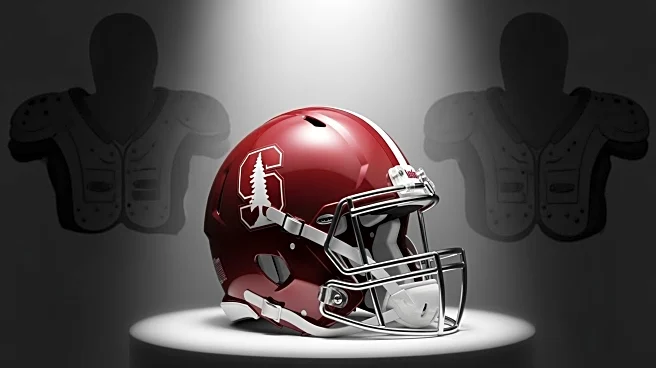What's Happening?
The Stanford Cardinal football team has successfully recruited three-star defensive lineman David Schwerzel, who was previously committed to UCLA. This development comes as Stanford continues to build a strong recruiting class for 2026, despite not having
a head coach selected for the upcoming season. Schwerzel, a 6'5" 255-pound athlete from Seattle, WA, announced his commitment to Stanford following the team's upset victory over Florida State. The recruitment of Schwerzel is seen as a significant addition to Stanford's defensive lineup, enhancing their prospects for the next season.
Why It's Important?
The acquisition of David Schwerzel is a strategic move for Stanford, as it strengthens their defensive capabilities and showcases their ability to attract top talent even amidst uncertainties regarding their coaching staff. This commitment could influence other recruits to consider Stanford, potentially boosting the team's overall performance in future seasons. For UCLA, losing Schwerzel represents a setback in their recruiting efforts, highlighting the competitive nature of college football recruitment. Stanford's ability to secure such commitments may enhance their reputation and competitiveness in the NCAA.
What's Next?
Stanford will continue to focus on finalizing their coaching staff, which could further impact their recruiting success. The team is likely to pursue additional high-caliber recruits to bolster their roster for the 2026 season. Meanwhile, UCLA may need to reassess their recruitment strategies to prevent further losses and strengthen their lineup. The dynamics of college football recruitment will continue to evolve as teams vie for top talent, with coaching decisions playing a crucial role in shaping future commitments.
Beyond the Headlines
This recruitment highlights the broader implications of college sports dynamics, where coaching stability and institutional reputation play significant roles in attracting talent. Stanford's ability to secure commitments without a head coach underscores the influence of academic prestige and athletic program reputation in recruitment decisions. This scenario may prompt other universities to evaluate their recruitment strategies and the factors that influence athlete decisions.
















